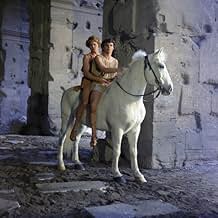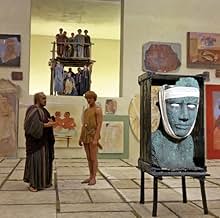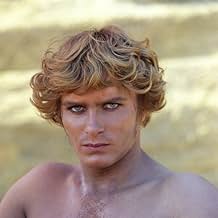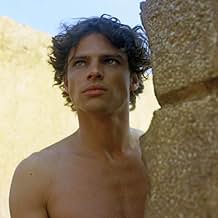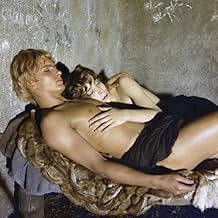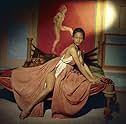Une série de contes mythiques situés au premier siècle à Rome.Une série de contes mythiques situés au premier siècle à Rome.Une série de contes mythiques situés au premier siècle à Rome.
- Réalisation
- Scénario
- Casting principal
- Nommé pour 1 Oscar
- 5 victoires et 8 nominations au total
- Trimalcione
- (as Il Moro)
- Scintilla
- (as Danica la Loggia)
- La matrona
- (as Lucia Bosé)
- Il suicida
- (as Joseph Weelher)
- Minotauro
- (as Luigi Montefiori)
Avis à la une
On one hand, its many flaws are rather upsetting. The out-of-sync lipping (bad post-sync), the fact that the movie neither really tells a story nor evocates sensible moral or philosophical concepts... so one may say it's actually a dull movie. The violence in this movie doesn't seem to make real sense, neither does the homosexuality, neither does the "romanian decadence" portrait.
On the other hand, the scenography, the sets, the costumes and makup are among the most dazzling ones you'll ever see in cinema, and the cinematography... well... maybe the BEST one you'll ever see. I can't think of any another movie able to compete with "Satyricon"'s mindblowing cinematography. Each scene is a terrific picture, with several visual layers, extraordinary lights and focuses, a lot of invention, of visual flair, and the overall technical mastery is stunning.
The result is something mesmerizing for some, totally disgusting for others. I have to say I'm more on the mesmerized side, because I was mainly focused on the visual/meditative aspects of the movie, not on the narrative ones.
If you're really into cinema, I mean as an artistic media more than as entertainment, you MUST see "Satyricon", as it's to my sense the most *visually* outstanding movie ever made. Be prepared for some disappointment about the movie as a whole, though...
As Vincent Canby said in his review, from 1970 in the New York Times, 'Fellini Satyricon is its own justification'. This movie exists purely to engage on an aesthetic level. The surrealism, the carnival-of-life atmosphere, the monumental pageantry, the visual juxtaposition of beauty and ugliness, and the black humour are all the film possesses and are all it requires. I believe that Fellini's intention with this film was simply to entertain. And he was a master entertainer, no doubt.
Don't expect much in the way of characterisation, of complex plot developments, or of nifty moral expression. This is a film that looks and sounds beautiful, and it manages to hold your interest (or mine anyway, I can't speak for everyone) for two brief hours by doing just that. Fellini = Godlike genius.
Le saviez-vous
- AnecdotesGian Luigi Polidoro registered the title Les dégénérés (1969) for his movie first. Federico Fellini fought to use the title for his movie but lost the case. Subsequently the title was changed to Fellini Satyricon.
- GaffesIn one version, Joseph Wheeler is credited as 'Joseph Weelher'.
- Citations
Soldier at Tomb: They've stolen the hanged man! While I was with you, the thief's family took him away! I know what punishment I'll get... a horrible death. Why should I wait for it? I'd rather die by my own hands.
[pulls his sword out and is about to stab himself]
Wife of Ephesus: [stops him] No! No, my dear... To lose the two men in my life, one after the other, would be too much...
Wife of Ephesus: [looks at the corpse of her husband] Better to hang a dead husband than to lose a living lover.
[the couple replace the missing hanged corpse with the corpse of her husband]
- ConnexionsEdited into Fellini: Je suis un grand menteur (2002)
- Bandes originalesThe Drums for the Niegpadouda Dance
From Anthology of Music of Black Africa
Recorded by Everest Records
Arranged by Bernard C. Salomon
Published by Arvon Music
Meilleurs choix
- How long is Fellini's Satyricon?Alimenté par Alexa
Détails
Box-office
- Budget
- 3 000 000 $US (estimé)
- Montant brut aux États-Unis et au Canada
- 1 135 943 $US
- Montant brut mondial
- 1 138 108 $US
- Durée2 heures 9 minutes
- Mixage
- Rapport de forme
- 2.35 : 1
Contribuer à cette page







